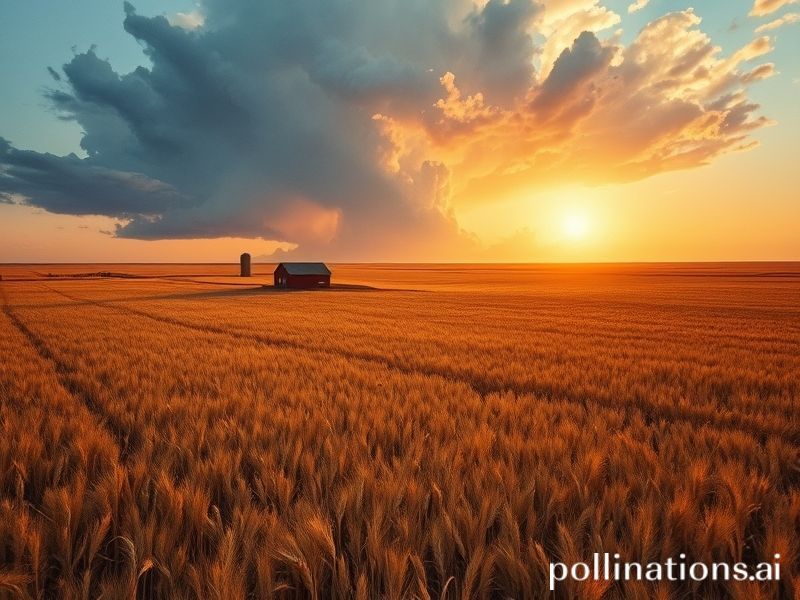Kansas: The World’s Breadbasket, Political Lab Rat, and Cautionary Emoji
KANSAS, USA—From a distance of 6,000 miles, the place looks like a sociological petri dish left too long under the heat-lamp of good intentions. Europeans who can’t tell Topeka from TikTok still speak of Kansas in the hushed tones normally reserved for extinct volcanoes: it blew once—something about The Wizard of Oz, wheat, and the illusion that rural virtue can outrun climate spreadsheets—and now it simmers, politely emitting the occasional referendum. To the rest of the planet, Kansas is less a rectangle than a cautionary emoji: 🌪️, cash-crop, culture war, repeat.
Global grain traders in Geneva keep the state on speed-dial. Roughly one in five slices of Parisian baguette starts as hard-red winter wheat from these high-plains parishes; the same goes for the ramen noodles slurped in Seoul at 3 a.m. by insomniac crypto traders. When Kansas sneezes—through drought, derecho, or a governor who thinks “export ban” is a French dessert—world wheat futures spike faster than you can say “Let them eat gluten-free.” The 2022 drought shaved 0.3% off global supply, which sounds trivial until you remember that commodity markets throw tantrums over decimal dust. Bread riots in Sudan and pizza-price memes in Naples both traced back to a dry July in Dodge City, proving that geopolitics now runs on prairie dust and wishful thinking.
Meanwhile, the state’s politics have become binge-watchable tragicomedy abroad. Brazilian columnists cite Kansas abortion referenda as proof that even conservative electorates can pivot when sufficiently irritated. Polish parliamentarians study the 2022 “No” vote the way medical students dissect rare tumors: fascinating, malignant, possibly contagious. And French farmers, who love a good strike the way Americans love tactical bacon, watch slack-jawed as Kansans vote down water-protection measures while their own aquifer—the Ogallala—recedes like a hairline on middle-aged denial. “They are drilling themselves back to the Dust Bowl,” muttered a Breton dairy farmer over cidre, unaware that his own cows’ feed depends on that same vanishing water. Sympathy is global; schadenfreude ships faster.
China, ever the polite superpower, has begun buying Kansas pork farms the way teenagers collect NFTs: quietly, then all at once. Locals who spent decades railing against “foreign entanglements” now wake up to Mandarin signage on feedlots and confucian-level irony: the heartland’s heart is now technically state-owned, just not their state. The transaction summaries read like absurdist poetry: “Smith County sovereignty swapped for soybean futures and a new high-school gym.” National security hawks in Washington scream; Wall Street shrugs; Beijing counts calories. Somewhere, Dorothy’s ruby slippers are being re-labeled “Made in Guangdong.”
Climate scientists in Nairobi use Kansas as a baseline for what happens when you combine flat geography with flatter revenue models. Satellite maps show counties browning in symmetrical squares—agro-engineered perfection marching toward systemic failure. The region’s burgeoning wind farms, praised by Berlin and subsidized by Tokyo, spin heroically in time-lapse shots that grace UN climate reports. Yet every turbine still needs a backup gas plant, because the wind, like a good Kansas narrative, refuses to blow on cue. Germany’s Energiewende consultants fly in, nod solemnly, fly out, and bill by the carbon-offset hour. Nothing says “global cooperation” quite like exporting existential dread in business class.
And still, the world needs Kansas. Not for jazz or coastal swagger—it has neither—but as a living control experiment: What happens when you subsidize corn, starve education, and pray for rain? The answer beams out via satellite to every agrarian society teetering on the edge of industrial temptation. From Uttar Pradesh to the Ukrainian steppe, policymakers watch, swipe, and learn. Spoiler: the lesson is password-protected by lobbyists.
So here we are. A rectangle of dirt, debt, and devout optimism continues to feed, electrify, and terrify the planet. The wheat ships out, the water table drops, the turbines spin, and the world places its bets. Kansas may not be Oz, but it is a crystal ball—one whose forecast reliably includes scattered storms, scattered votes, and the scattered remains of anyone who thought geography was destiny rather than a long, slow punchline.







